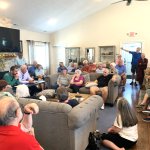CREST HAVEN – For a lot of high school students, the future probably seems rather uncertain, but for those in Cape May County Technical High School’s welding technology program, it could be out of this world.
According to welding teacher Thomas Jackson, his former students have worked on large-scale projects such as the James Webb Space Telescope. They’ve also welded steam condensers for nuclear submarines and done work on the Ben Franklin Bridge, he said.
Jackson said many of his students are going right into the workforce after graduation, having been recruited by unions and businesses, but he said most need to go on to post-secondary education in welding.
“Most have to go out of state for a good school, such as the Hobart Institute or Lincoln Welding School,” he said.

Jackson was speaking in his third-year welding class, where the students are working on certification. He said there are commercial welding inspectors who come in and make sure the students are doing things right.
He said there are two types of inspections in the certification process. There is a visual inspection and a destructive weld test, in which stress is put on the weld. Once they pass, the students will be certified through the American Welding Service.
Seniors who graduate from the welding technology program are eligible to apply for the Charles Dank Memorial Scholarship, awarded for the further study of welding at a post-secondary trade school.
Jackson started teaching welding in 2007 in both night school and day classes at Cape Tech; he has since given up the night classes. He said he has students from all over the Cape May County community, a community he depends on for the welding program.
“If not for the Morey’s Piers organization we would not have a certified welding program,” he said. “A lot of local businesses support the program.”

Jackson also mentioned as supporters of the program Lunds Fisheries, Atlantic Cape Fisheries, Mitchell Iron Works, TMU, South Jersey Welding Supply, Keen, Fazzio’s, Burkhardt Welding, Steel Pier, multiple businesses and refineries in the Philadelphia area and United Uniforms, which has made sure students have individual welding attire.
He said the support of the community and businesses allows the students to have protective leathers, gloves, goggles, regulators, welding rods and even jobs.
“If not for the community we would not be able to survive,” he said.
Jackson said he had been trying for years to get uniforms for his students. Having them now helps inspire a sense of unity in the program. He said he tells the first-year students that they are a family, and family members help other family members. He said each level of students has group chats where they talk about their welding experiences.
When the program hosts exploratory visits by potential students, the older students guide them and keep everyone safe in the shop environment. Graduates, he said, look out for students in the program, often helping them find jobs.
Indicating a student with a stylized welding helmet, something akin to how goalies have customized helmets, Jackson said the older students tend to get state-of-the-art helmets as they progress.
“Sometimes they ask for them for Christmas,” he said. “Some of them cost hundreds of dollars.”
While they have to learn using the traditional, old-school welding helmets where they lower them to weld and raise them to examine their work, the new auto-darkening helmets have a viewing area that adjusts from light to dark and back depending on the work being done.
“I have them learn using the old-school helmet, then allow them to get their own helmet,” he said.
Jackson said the quality of his students’ work is amazing, and he wants the community to know what they are doing.
In his third-year class, one of his students, Lacee Adams, was polishing a bead. Jackson said girls are not only accepted in the welding program, they are excelling.

“They are some of my best students,” he said. “For one thing, they ask a lot of questions. And they are very good at following instructions.”
All of his students have learned about the potential for having a career in the welding trades.
Blake Horton from Lower Township is a senior third-year welding student.
“I wanted to weld since I was a kid,” he said. “I saw my dad and uncle welding, and I just wanted to weld.”
Horton said he also knew that Jackson was a good teacher. He has been inspired to attend another school after high school, and he is following the industry to see what jobs are available.
Jeremiah McGonagle, a third-year welding student from Dennisville, said his mother, aunt and uncle all attended Cape Tech, and he decided to apply to pre-engineering as his program, but once in found he didn’t like it. The school allowed him to make the change.
“I came in and shadowed in the class for a couple days, and after a couple of weeks I was caught up with the rest of the class,” he said.
McGonagle said Jackson brings in speakers from the community, sometimes from unions or trade schools, and even from the Navy. He feels everything is lining up for him now.
“I feel I have a very bright future,” he said.
Contact the author, Christopher South, at csouth@cmcherald.com or 609-886-8600, ext. 128.









